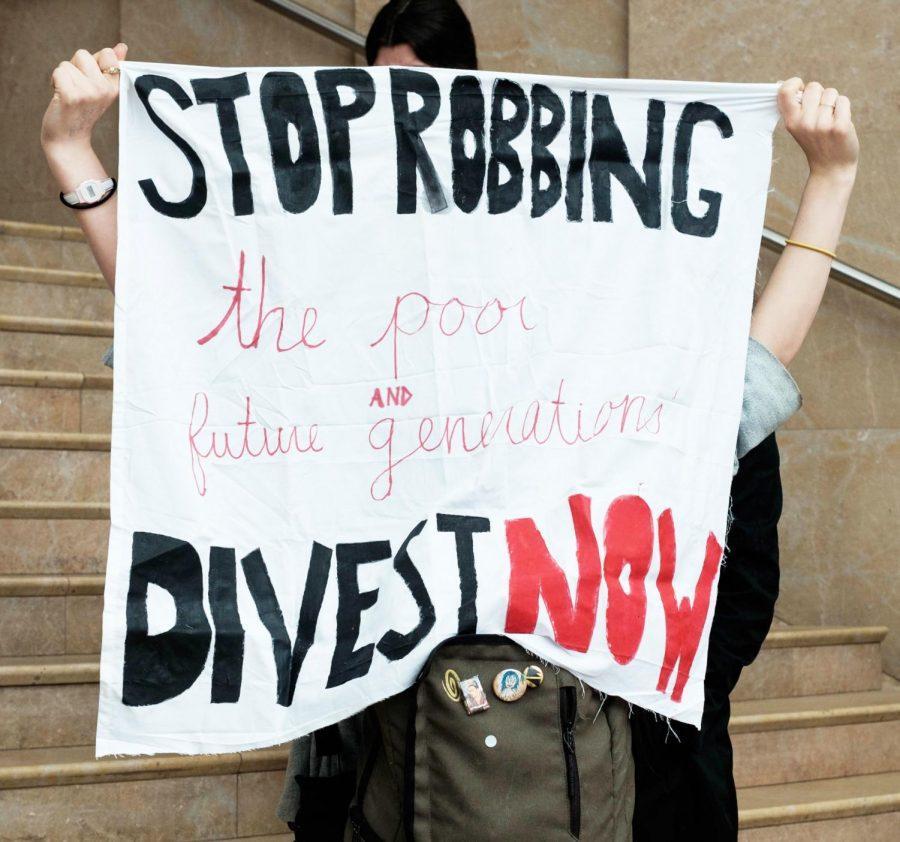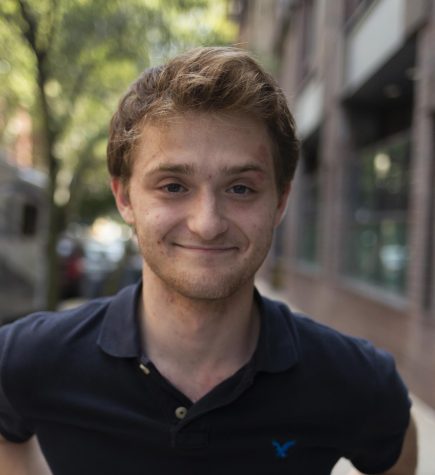An Inside Look at the Group Pushing NYU’s Administration
A demonstrator holds a banner that demands NYU to terminate all investments in fossil fuel companies.
April 2, 2018
On the morning of Thursday, March 29, the University Senate passed three resolutions that would allow student, tenured faculty and contract faculty representation on the Board of Trustees. The resolutions have been relayed to the board, which will vote on whether to approve or reject each resolution.
It is unknown how soon the board will hold these votes. It took the board 14 months to vote and eventually strike down a University Senate resolution for fossil fuel divestment in 2016.
The resolutions for student and faculty representation are championed by the Student Labor Action Movement, an NYU activist group which has advocated for greater representation and increased transparency repeatedly since its inception.
A crucial voice in the resolutions’ being passed was CAS junior and NYU Student Senator Husniye Cogur, who has supported SLAM’s demands in the past and who helped write the resolutions proposed to the University Senate.
SLAM’s demand for student representation on the board received an endorsement from NYU alumnus and New York City Mayor Bill de Blasio in September, who unsuccessfully advocated for the same goal as an NYU undergraduate.
Last week was SLAM’s busiest of the year thus far. From March 26 through March 29, SLAM members — alongside members of NYU Divest — occupied the Bonomi Family Admissions Center for three days and the Kimmel Center for University Life for two days.
Representatives from SLAM and Divest met with Senior Vice President for University Relations and Public Affairs Lynne Brown and Senior Associate Vice President of Student Affairs Tom Ellett. In this meeting, the administrators threatened activists with disciplinary action if they occupy any building past its closing time and requested a week to address a demand from the activists to have a public town hall with administrators and trustees by the end of the semester. Following this meeting, activists decided to suspend their occupation.
Inside SLAM’s Organizing
Thursday’s victory was the culmination of months of preparation and advocacy, most of which was unseen by the public. Although this time-consuming work often requires its members to sacrifice other aspects of their lives, activists express few regrets.
“My GPA has definitely dropped because of organizing, but I’m pretty fine with that,” CAS junior and SLAM member Ben Zinevich, who is currently studying abroad in Buenos Aires, said in a video call with WSN. “I don’t think that there’s anything else on campus that can give me the sense of fulfillment that student activism has.”
Gallatin sophomore and SLAM member Stephanie Rountree agrees.
“You’re only going to remember so many of your readings or your classes from college,” Rountree said. “Through activism, you build these bonds and connections that won’t go away and you pick up new skills in dealing with things. It’s just fighting for something greater. Your essays can’t really facilitate that, but direct action can.”
SLAM has an incredibly tight-knit community of core members, who see each other not only as fellow activists, but also as close friends. Its members explain that this is necessary to its efforts; to take part in any aspect of SLAM’s activism — making difficult decisions, occupying a campus building for hours, confronting administrators and trustees — requires its members to get along well, to support one another and to get things done quickly and cohesively.
“I’ve been in a 30-hour occupation with people and come out after 30 hours so bonded,” Gallatin senior and SLAM member Hannah Fullerton said. “You are holding each other up, you are all putting yourselves on the line for something together, which is so powerful. There’s this bond when you’re showing up for something together that just can’t be paralleled.”
SLAM uses meticulously developed tactics for group discussion. Activists use a complex set of hand signals — for emotions such as agreement, disagreement and a desire to interject — to facilitate conversation. At every meeting, one of its members keeps track of who has signaled a desire to speak, allowing each member to have their voices heard and preventing verbal competition.
Members agree to several key assumptions and principles going into conversation. Participants are reminded to assume best intent in dialogue, a method that prevents anyone from taking personal offense to disagreement. The group has no delegated leaders, so as to avoid conflicts over power and hierarchy and to emphasize that each of its members’ opinions are valued equally. And in every discussion, members strive for genuine consensus and are rarely satisfied unless nearly every member of the group is on board with a prospective decision.
“You have to trust one another when you’re operating in this way, without hierarchy,” Fullerton said. “And you also have to know each other in a real, intimate way, not in a coworker-y way. We’re like a beehive, we’re operating like a big unit, so we have to be able to have those kind of bonds.”
SLAM’s activists reminisce fondly on their memories of joining the group.
“One piece of advice that I’d like to extol is always trust the people who hand you a disorientation guide,” said Zinevich, who joined as a first-year after picking up a guide from a SLAM activist. “In the end it has all of the truths about the university just laid out in a very easy to read format.”
When Fullerton originally came to NYU on a sizeable scholarship, she felt appreciative that the university was helping fund her education. Yet, upon arriving as a student, she started to notice how much unexpected debt she — and others she knew — would graduate with, which drove her to join SLAM.
“I made a [Facebook] post asking why no one is doing anything about debt on campus, and someone commented that there are people doing it — they’re called the Student Labor Action Movement,” Fullerton said. “I was like ‘word.’ And then I got totally radicalized.”
Although SLAM takes up a significant amount of time for its most dedicated members — a core group of only 10 to 15 students do the vast majority of organizing and activism — its members feel that SLAM has helped them develop skills that will help them apply for jobs and succeed in the workplace.
“As a person applying for jobs right now, it is the most transferable job,” Fullerton said. “You know how to event plan, you know how to recruit, you know how to do outreach, you know how to publicly speak, you know how to do media, you know how to negotiate, you know how to budget — you know literally everything. There is not a path I think you could go into that this would not inform.”
Fullerton also spoke to the importance of practicing activism.
“I think the main lesson [I’ve learned] is the f-cking cliche protest chant, ‘The people united will never be defeated,’ and direct action has shown that over and over and over again,” she said. “You can read that in the classroom, you can watch a documentary on it, but when you’re actually practicing that, you know it in a way that’s more than just believing it’s true or hoping that it’s true — you’ve experienced it. And that does change your way of walking throughout the world and engaging with other human beings.”
SLAM continues to advocate for a public town hall with trustees by the end of this academic year. In a March 30 email to administrators, activists stated their intent to occupy Kimmel indefinitely, starting on Monday, April 9, if they do not receive a satisfactory response by Friday, April 6.
A version of this article appeared in the Monday, April 2 print edition. Email Alex Domb at [email protected].

























































































































































